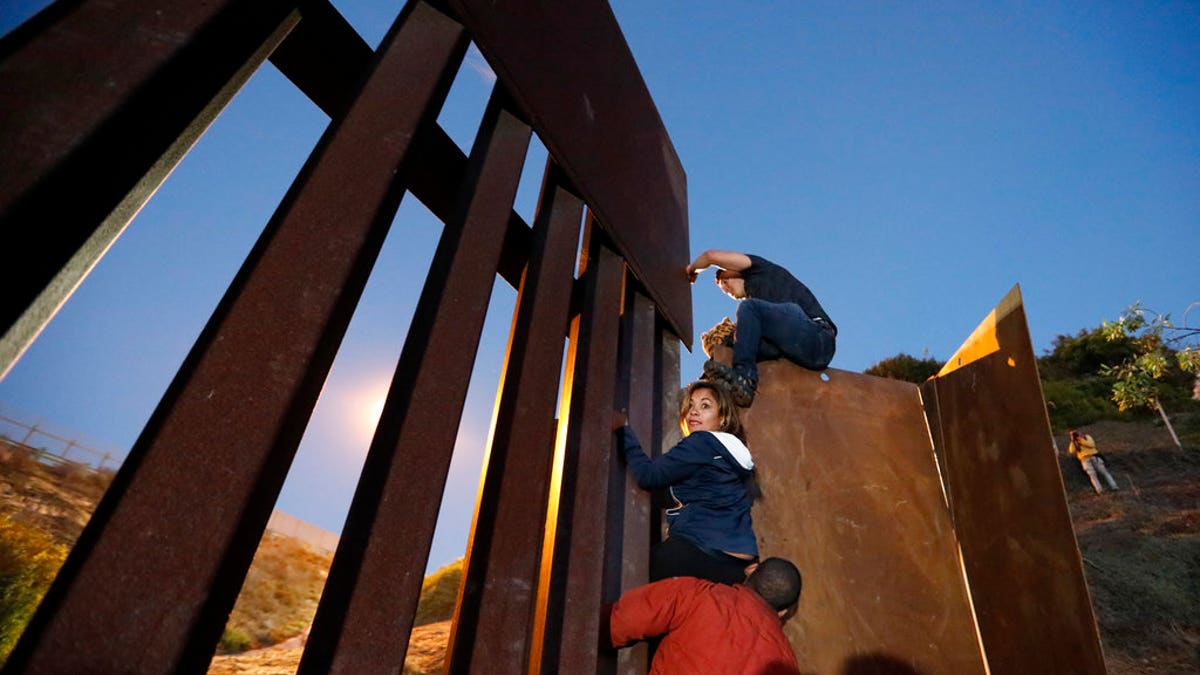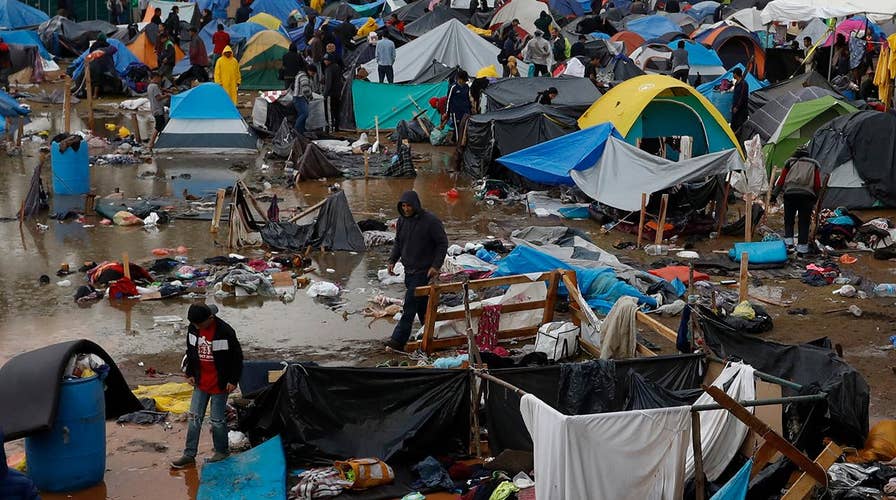Migrant caravan impacting businesses on southern border
Local officials say the migrant caravan is costing Tijuana businesses millions of dollars. Steve Harrigan reports from Mexico.
SAN DIEGO, Calif. - A group of San Diego-based nonprofits claim they are running out of money and space to house, clothe and feed hundreds of asylum-seeking families ICE agents have been quietly transporting in and dumping onto the streets.
The San Diego Rapid Response Network (SDRRN), a coalition of human rights, service and faith-based organizations, is urging government officials to develop and implement “a sustainable plan to keep vulnerable asylum-seeking families off the streets and help them reach their final destination.”
The organization claims that U.S. Immigration and Customs Enforcement has released hundreds of migrants into San Diego – the largest land border crossing in the world.
The problem, SDRRN says, is that the recent influx is too much to handle.
“The shelter can accommodate only about 150 people, with average stays of 24 to 48 hours,” Edward Sifuentes, a spokesman for the ACLU of San Diego & Imperial Counties, said. “It stays filled to capacity because as quickly as one group of families moves on, others are released by immigration authorities.”
MIGRANT CARAVAN HURTS TOURISM IN TIJUANA: 'THEY'RE KIND OF SCARED'

Central American migrants planning to surrender to U.S. border guards climb over the U.S. border wall from Playas de Tijuana, Mexico, late Monday, Dec. 3. (AP Photo/Rebecca Blackwell)
Sifuentes warns that “the need for migrant shelter and related services is expected to escalate in coming weeks as hundreds gather in Tijuana hoping to claim asylum in the U.S.”
Once asylum seekers are processed, federal agents drop off them off at various shelters and Greyhound bus stations around the city at the person’s request.
Norma Chavez-Peterson, the executive director of the ACLU of San Diego and Imperial Counties, said the network’s resources have been stretched to their thinnest point yet. The network is on their fifth shelter location in six weeks, and for the first time has had to turn families away due to capacity.
“We're at a moment of a lack of capacity, we cannot sustain this any longer,” Chavez-Peterson said. “We need a higher level of leadership.”
During a press conference at Our Lady of Mount Carmel in San Ysidro, Chavez-Peterson outlined what the network needs to continue to fill the gaps of care for asylum seekers. In a series of meetings with state and local government leaders, she has advocated for an infusion of cash and physical resources, along with a concrete plan of sustainability.
Specifically, she said the network needs a high-capacity facility that can house up to 200 people, along with the resources to hire staff, security, provide food, travel money, and cover some transportation costs for the asylum seekers. Most urgent among these is a secure, stable shelter.
Often, though, the migrants themselves have nowhere to go, Vino Panjanor, executive director of Catholic Charities at the Diocese of San Diego, told Fox News. If they by chance have a place to go, they typically have no way of getting there.
“These migrant families consist of small children as young as a 3-day old baby,” he said. “We don’t have resources. We are working on shoe-string budgets. This started on Oct. 26. It’s week 5. It’s not sustainable.”
Several other humanitarian groups echoed Panjanor’s sentiments and say they are running out of options.
HONDURAN WOMAN, 19, IN MIGRANT CARAVAN SCALES BORDER WALL TO GIVE BIRTH IN US AFTER 2,000-MILE TRIP

The San Diego Rapid Response Network claims that U.S. Immigration and Customs Enforcement has released hundreds of migrants into San Diego – the largest land border crossing in the world. The problem, SDRRN says, is that the recent influx is too much to handle. (San Diego Rapid Response Network)
“SDRRN’s efforts were intended as a stopgap measure, but the growing number of asylum-seeking families in need is surpassing the network’s collective ability to provide basic resources, including food, shelter, emergency healthcare and travel assistance,” the organization told Fox News in a written statement.
Since setting up an emergency shelter in November, SDRRN has helped more than 1,700 migrants released by federal immigration authorities. Those released have been initially processed by Homeland Security and are waiting for their scheduled ICE hearing which can be months away. Without a safe place to go, many wander the streets homeless and hungry.
“We have to take some to the ER for medical help,” Panjanor said. “This isn’t a political issue. We aren’t taking a political stand. It’s a humanitarian one.”
ICE told Fox News: “Family units that are released will be enrolled in a form of ICE’s Alternatives to Detention or released on another form of supervision.”
It added: “ICE continues to work with local and state officials and NGO partners in the area so they are prepared to provide assistance with transportation or other services.”
Not satisfied, SDRRN has reached out to local and state leaders pleading for help.
California’s Gov.-elect Gavin Newsom, a Democrat who frequently takes on the Trump administration over immigration issues, recently said the state government needs to step up and make a greater effort in supporting asylum seekers.

Since setting up an emergency shelter in November, SDRRN has helped more than 1,700 migrants released by federal immigration authorities. (San Diego Rapid Response Network)
“We’re all in this together,” he said. “I feel a deep sense of responsibility to address the issues that we as a border community face and I think we need to humanize this issue, not politicize the issue.”
For now, it seems that migrants are stuck in San Diego.
Many, though not all, have fled countries like Honduras after receiving death threats from brutal street thugs such as MS-13 and the 18th Street gang. Some are also running from corrupt government officials in their home countries that have made living there sheer hell.
The migrants are also having a tough time returning to Mexico. Residents there are fed up by thousands of Central American asylum seekers pushing their way onto Mexican soil. Some have circled encampments and shouted at migrants.
In one case, things got so bad that an 8-month pregnant woman, her husband and toddler son, scaled a portion of the border wall after feeling unsafe at a caravan stopping point near the Tijuana-San Diego border.
Late last month, Mexicans in Tijuana marched down the street with one clear message to the migrants: Get out!
“We want the caravan to go; they are invading us," Patricia Reyes, a 62-year-old protester, hiding from the sun under an umbrella, told NPR. "They should have come into Mexico correctly, legally, but they came in like animals."
Fox News' Andrew Keiper contributed to this report.


